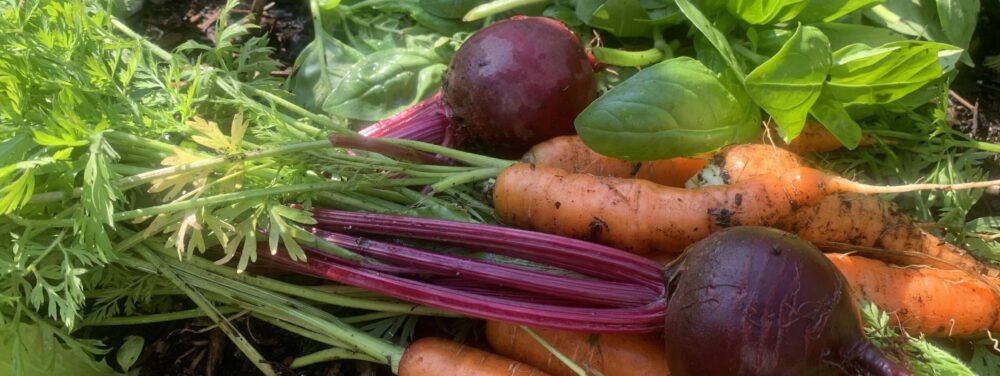Borage, also known as starflower, is a badass annual plant in my garden that blooms from April to October. Here’s five benefits of growing borage:
1. Bees
The bees and other pollinators love borage. At any given moment in the spring and summer, I can spot bees buzzing on my borage plants. The more bees, the more likely they will pollinate nearby plants. Plant borage throughout your vegetable garden to help the bee population and pollination.

2. No Fuss
Generally, borage is a no-fuss plant.
As long as there’s good drainage, borage isn’t picky about soil conditions. And the plant requires little water.
The plant self-seeds easily, too. Last spring, our borage self-seeded throughout our vegetable garden. Borage seedlings were growing in places we didn’t want them, so I transplanted a few to the borders of our garden beds and even created a small borage hedge. Because borage self-seeds so well, you don’t have to buy borage seeds year after year. Just be prepared to pull out a few seedlings to control your borage population.

3. Deer Resistant
Borage is also resistant to deer. We live in deer, bear, and cougar country and are always happy to find a plant that the deer don’t eat.
4. Pest Control
Borage helps to deter the cabbage moth caterpillars (and other pests like hornworms). Cabbage moth caterpillars can quickly destroy broccoli plants. The moths often lay their eggs on broccoli and other brassicas. Those tiny eggs hatch and become caterpillars that love eating broccoli as much as I do.
I experimented this year. Typically, I cover all my broccoli and brassica plants with white cloth to prevent the moth from laying eggs on them. This year, I covered all but one broccoli plant. The uncovered broccoli plant was growing next to a borage plant, so I decided to see if the borage would keep the caterpillars away. Five months later, the broccoli plant is still uncovered, still undamaged by the caterpillars, and still producing broccoli. I won with that plant. Was it luck or the borage? I vote for the borage.

5. Mulch And Compost
Borage adds trace minerals to soil and compost. After trimming my borage plants, I cut the branches up and use the pieces as mulch. Mulching helps control the weeds and feeds the soil as it decomposes. I’m careful to keep the flowers out of my compost pile so I don’t have seeds germinating in unwanted places.

Those are give benefits of growing borage in your garden. If you haven’t already, give borage a try. Maybe you’ll find this plant a badass one, too.


